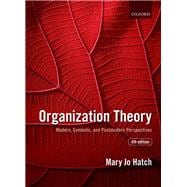Organization Theory offers a clear and comprehensive introduction to the study of organizations and organizing processes. Through the unique three-perspective approach, students are challenged to explain, explore, and evaluate organizational theory, drawing on their own experiences as well as the book's diverse practical examples.
The fourth edition includes a host of new learning features, which examine the practicality of theorizing and encourage students to broaden their intellectual reach. "Theory to Practice" boxes and case studies highlight organizing processes in a range of settings, either through real-life business examples or through exercises that encourage students to apply the theory within their own environment. "Think like a Theorist" and "Exercise Those Perspectives" boxes then encourage students to actively theorize and evaluate, developing essential critical thinking skills and a greater understanding of the complex knowledge produced by organization theorists. By taking theory off the page, students can learn through doing and adopt a reflective stance to the world around them.
Mary Jo Hatch draws on her extensive experience in the field to produce a trusted and accessible introduction to the subject that provides academic depth, engaging pedagogy, and a practical focus.
ONLINE RESOURCES:
For Students:
*Multiple-choice questions
For Lecturers:
*PowerPoint slides
*Figures and tables from the book
*Lecturers' guide
*Additional case studies








